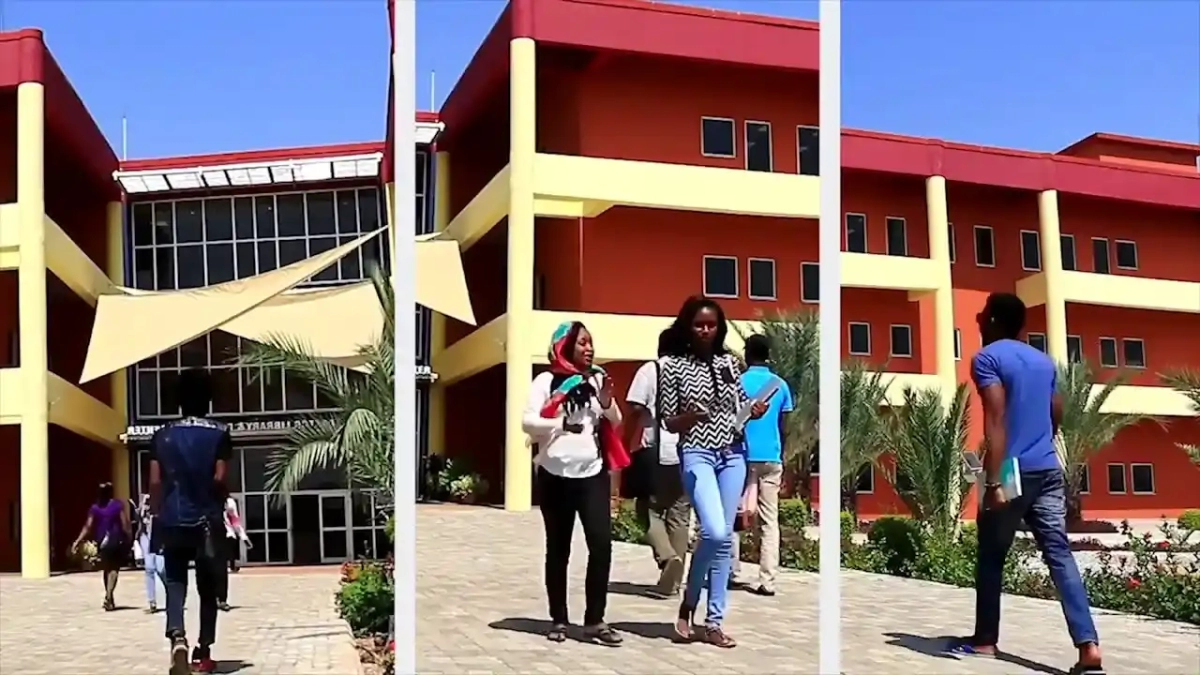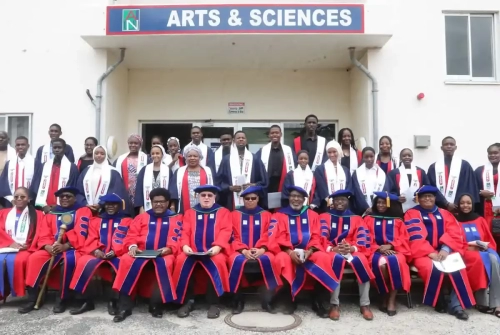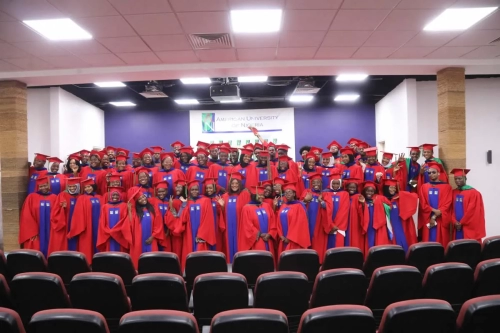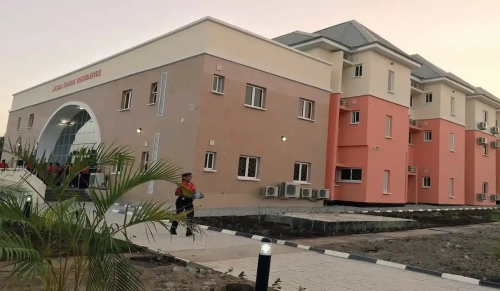The American University of Nigeria (AUN), located in Yola, Adamawa State, Nigeria, is a private university offering an American-style liberal arts education. It is known as Africa's first "Development University" and the first American-style university in Sub-Saharan Africa. The goal of AUN is to train the future leaders of Africa and to serve as both a stimulus and agent of economic development throughout the region. All students, regardless of academic specialization, receive high-level training in information technology, entrepreneurship and in arts and sciences, all of which are the key to future sustainable development. AUN is committed to providing the skills and the leadership essential to advancing the continent's pressing social and economic challenges.
| Acronym | AUN |
| Nickname | AUN |
| Motto / Slogan | For God and Country |
| Founded | 2003 |
| Location | Yola North, Adamawa, Nigeria |
| Address | 98 Lamido Zubairu Way Yola Township bypass, PMB 2250, Yola Adamawa State, Nigeria |
The American University of Nigeria's (AUN) mission is to provide a high-quality, American-style education that prepares future leaders for Nigeria and Africa, equipping them with the skills and knowledge to address development issues and contribute to a more just and prosperous world.
AUN seeks to become a great center of learning and research for Nigeria and Africa and a catalyst for development in the entire world.

The primary objective of the American University of Nigeria (AUN) is to train future leaders in Africa and to serve as a catalyst for economic development in the region.
Coming to AUN and experiencing an American-style university education is new for most African students and for their parents. We are very conscious of the cultural differences (and similarities) between Nigeria and the United States and work hard to develop an intercultural understanding among all members of the AUN community. An American-styled education focuses on critical thinking, problem-solving, and leadership development.
Unlike universities in many other countries, in addition to studying a specialty such as "Petroleum Chemistry" or "Marketing" or "English Literature,” American universities have programs in "General Education." That means students study more broadly; they learn ideas from other specialties.
As in all universities, each student is expected to specialize in a particular course of study. In the American system, such specialties are called “majors.” All students will graduate with a particular major. Some students also want to learn about another field of study in some depth, but not as their primary focus. In the American system, such sub-specialties are called “minors.” Thus, one could major in Economics and minor in Journalism, or have some other combinations.
Some courses are required of all students, and some are courses that students choose themselves as electives. Students (with the help of their Chair and academic advisors) get to choose which course in science--for example--is most interesting and helpful. Even "majors" and "minors" allow students to make some individual choices within their respective specialties.
Because some of the distinctive features of American education are to help train students to think for themselves, be creative, and solve new problems, students are required to actively participate in class. They don't just sit and absorb what comes from teachers, books, and the Internet. They are expected to ask questions, discuss the course materials with fellow-students and professors, read avidly, think critically, and confidently defend their own ideas.
Applicants must possess a minimum Joint Admissions and Matriculation Board (JAMB) score of 160 or JAMB's yearly official cut off score to be considered for admission at AUN. Also required for admissions consideration are five credits, including English Language and Mathematics, on no more than two Senior School Certificate Examinations (SSCE) sittings. Exceptions, if any, are made on a case-by-case basis.
Applicants are welcome to join our international community. They also must demonstrate their preparedness for university study through official external exam scores (the bac, for example) and secondary school transcripts, which must reflect preparation similar to that required for Nigerian students.
The minimum admission requirements for Engineering and Technology disciplines should be passed at credit level in the SSCE or General Certificate of Education (GCE) Ordinary Level (“O Level”) in five subjects, including Mathematics, English Language, Physics and Chemistry. Candidates who have Further Mathematics and Technical Drawing at credit levels will have added advantage.
Candidates seeking admission into the Bachelor of Laws (LL.B. Honors) program must in addition possess a credit in Literature-in-English.
Students with O Levels
Direct Entry/Transfer Students
International Students
Required Application Documents
You can apply using either of the following:
Option A: Online Application
Option B: Hard-Copy Application
After submission, you may be contacted by AUN’s Admissions Office for further steps or clarification.
You can reach out directly for updates or support:
Email: [email protected],[email protected]
Phone : (+234) 805-502-6923, (+234) 805-720-1938




National Universities Commission (NUC)
Dr... read more
Prior to joining Iowa Wesleyan, Dr. Frazier was the Associate Vice President for Academic Affairs and Dean of the Graduate School at Campbellsville University in Kentucky, where he oversaw 17 different graduate programs in various disciplines.
Prior to his work at Iowa Wesleyan, Dr. Frazier served as the Senior Vice President for International Programs at Upper Iowa University (UIU). There, Dr. Frazier oversaw campus internationalization efforts, including the implementation of an international student recruitment plan and the growth of UIU’s academic extension centers abroad.
Dr. Vita’s early career was distinguished by his deep commitment to teaching and groundbreaking humanistic research, publishing and editing extensively. His teaching at post-secondary institutions started with his preceptorship at Columbia, where he was selected to teach “Literature Humanities,” a distinctive feature of the College’s internationally renowned core curriculum. He also served as an assistant professor, while completing his dissertation, for two years at Morningside College (now University), in Sioux City, Iowa, during which he was inducted as a faculty member into the National Honors Society, Omicron Delta Kappa, and advised the institution’s chapter of Sigma Tau Delta, which was awarded the Tommaraasen Award for Excellence in Leadership and Service.
Dr. Vita moved to Spain to join the faculty of Saint Louis University’s Madrid Campus (SLU-Madrid) in 1999. Four months later, he was appointed Director of the Faculty of Communication and English. In this role, he played an instrumental role in launching the institution’s first accredited degree program, the M.A. in English, which transformed the campus into a degree-granting institution. He was promoted to the Deanship in 2008, representing SLU-Madrid as its Chief Academic Officer within the University as well as externally, such as at the annual meetings of the Association of American International Colleges and Universities (AAICU).
He obtained his LL.B (Hons) from Usmanu Dan Fodio University, Sokoto in 1989, called to the Bar as a Barrister-at-Law (BL) from the Nigeria Law School Lagos in 1990. He obtained his Master of Laws (LL.M) and Doctoral Law Degree (PhD) from Ahmadu Bello University, Zaria in 2008 and 2017 respectively and a Post-Doctoral Fellow at Institute of Advance Studies in collaboration with Obafemi Awolowo University Ile-Ife in 2020He began his academic career in Federal Polytechnic Kaduna where he taught law for 15 years and rose from Lecturer III to Senior Law Lecturer. He proceeded to the Nigeria Police Academy Wudil, Kano as a pioneer Law Lecturer and Faculty of Law Examination Officer. In 2016 he left the shores of Nigeria to Uganda in East Africa to continue his academic career firstly at Kampala International University as Senior Law Lecturer and Associate Dean Research. He was a visiting Law Lecturer at Nkumba University Entebbe, Uganda. He later joined the academic staff of the Islamic University in Uganda (IUIU) where he rose to the position of the Dean, Faculty of Law, the position he held till he returned to Nigeria and joined American University of Nigeria. While in Kaduna Polytechnic he conducted 3 research which were funded by the Tertiary Education Trust Fund (TETFUND). Again in Uganda, he won a research grant from the Islamic Development Bank under the auspices of the Research and Coordination Committee of the Islamic University in Uganda. He authored and published 10 standard law books.
Immediately after his doctorate degree, he was employed as a research consultant at Mildwaters Consulting LLP. He has extensive knowledge of the legal, regulatory, and business environment in Africa. In addition to practice experience, he also has extensive consulting and advisory experience involving transnational transactions.